How a Global Community Applies AI to Help Vulnerable Populations during COVID19
April 21, 2020

When travel is restricted, schools closed, businesses shut down, and communities put into quarantine, people lose income, employment, and access to healthcare and food.
While enforcing these lockdowns, are Government policies around the world taking into account the poorest and the most vulnerable?
A question we are answering in our Coronavirus Policy AI project with 70 collaborators from around the world.
Our first point of analysis was to look into some of the harmful side effects of the lockdowns.
Unintended consequences of the lockdown
#1 Increase in domestic abuse
In the first three weeks of the lockdown domestic abuse killings in the UK more than doubled [1], Childline India helpline received more than 92,000 SOS calls asking for protection from abuse and violence in 11 day which is an increase by 50%[2], Lebanon and Malaysia, for example, have seen the number of calls to helplines double, compared with the same month last year; in China, they have tripled, in France increase by a third [3]
“ It heightened the danger for women forced to stay at home with their abusers. Children are now even more exposed to trauma.”
#2 Poor kids do not have access to food
120 Million poor kids get their midday meal in India alone from their schools. This is often the only source of healthy food for those children. Closing schools will deny these children access to food. Feeding children that usually would get their lunch at school is also a problem in developed countries. For example, US food banks have seen a huge spike in need and estimate it will need an additional $1.4 billion to meet increased needs over the next six months [5].
#3 Increase in forced child marriage
During Ebola, it was seen that there was an increase in forced child marriage[6]. The same is expected during the Coronavirus lockdown.
Those are only a few examples out of many devastating consequences.
Looking at all the above, the question arises if government policies are inclusive and take into account the poor and vulnerable?
‘If you don’t address poverty, you can’t stop the virus,’
‘It’s almost as if some people think they can put a fence around the groups they left out’
‘Even when we take the rich countries, poor people know from history that every time there is some great struggle, whether it’s the Great War, or the Spanish flu, or the recession of 2008, they are hit the hardest’. [7]
Government policies cannot just look at stopping the spread of the virus but also have to look at how policies will directly impact people who are most vulnerable. There may be a fundamental problem in the current form of governance, which is top-down and lacks the ability to see the full picture.
‘The central planner is unable to obtain all the necessary information to organize society in this way, as information has subjective, creative, dispersed, and tacit qualities’ [8]
The Alternative: Bottom-up collaboration
To solve the current crisis (health, economic, humanitarian), we need a global effort that is sadly missing.
‘Be the change you want to see in the world’ — Mahatma Gandhi.
And this is what Omdena started doing.
Omdena is an innovation platform for building AI solutions to real-world problems through the power of bottom-up collaboration.
We gathered a group of 70 data scientists, AI/ML experts and domain experts from all over the world and across 6 continents. The experts are working (or worked) at the World Health Organization, The World Bank, European Commission, and UNICEF USA.
And the enthusiasm was clearly visible.
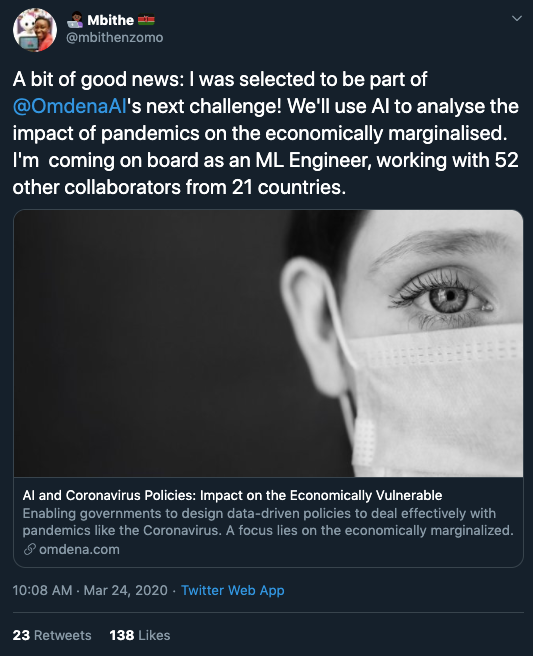
How AI can help to design inclusive policies
We have identified vulnerable populations based on the following criteria:
- Limited access to health facilities
- Wage loss
- Employment loss
- Facing domestic violence
We then created a Mathematical Formulation:
V — vulnerable populations (e.g. population weighted by poverty or accessibility index)
f(policy): impact of policy
F — resulting in the financial state of a vulnerable population (e.g. has job / daily earning)
H — resulting in the health state of a vulnerable population (e.g. COVID 19 — deaths/infections)

Equation proposed by Arthur Wandzel
We broke down the problem into multiple tasks, below are some of the results (we will publish all the results at the end of May).
Task 1: Identify the list of countries
task-managed by Alan Ionita
We are looking at different countries based on metrics like UN income classification, the Human Development Index, and the Inequality-adjusted Human Development Index (IHDI).

Inequality-adjusted HDI. Shared by Mauricio Calderon
Task 2: Access to health facilities
task-managed by Rohet Sareen
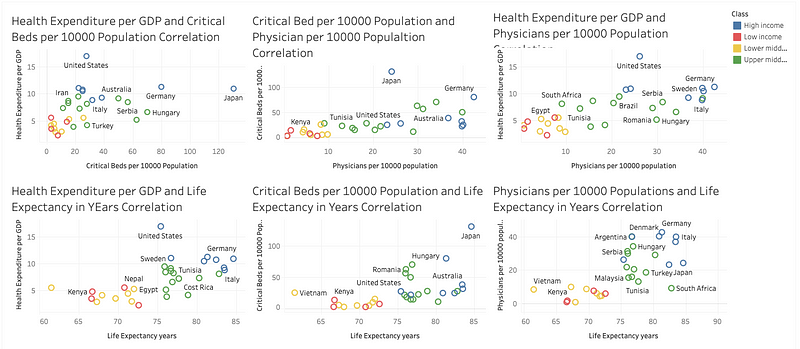
Work by Nikolaus Siauw
The data consisted of aggregated features related to Access to Health care facilities for certain countries. Features like Health Expenditure, Critical Beds, Physicians as well as Income Class of Country ( as per GDP) were used to account for each country’s healthcare using a variety of data sources.
The key objective was to get a cluster of countries having similar health care facilities which can then propagate the task of policy building for the health-care domain. K-Means Clustering Method was used along with a Principal Component Analysis (PCA) Method to map it on a 2-D graph as shown below.
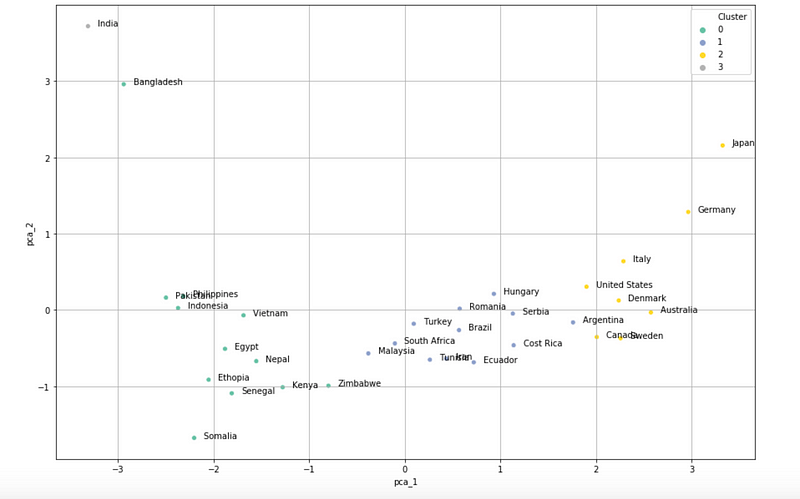
Work by Kushal Vala
As we can infer from the graph that, certain countries sharing similar demographics and economic condition were clustered together.
The next step is to study each cluster and refine the model using different approaches and tuning the parameters.
Task 3: Domestic Violence
task-managed by Elke Klaassen
We also looked at the average search for child abuse and domestic violence after and before policy.
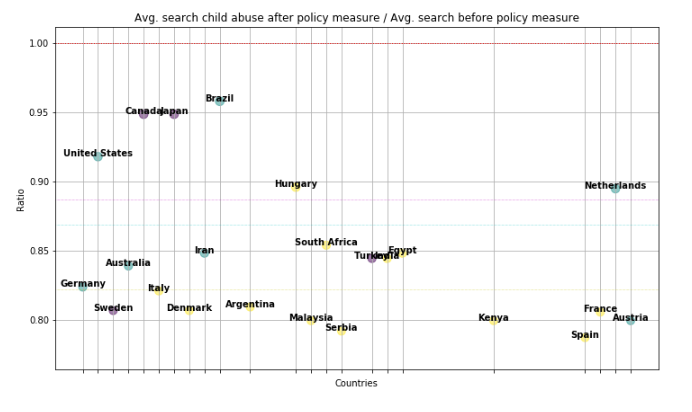
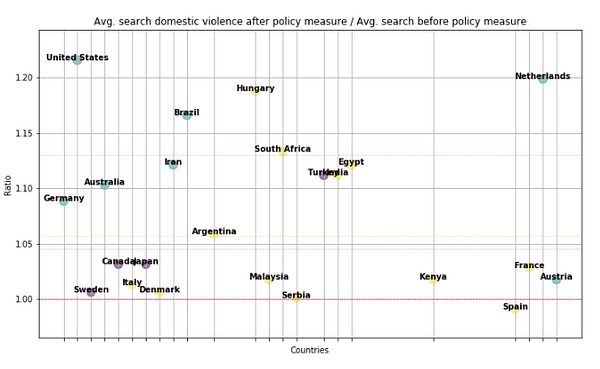
Work by Aaron Ferber
Task 4: Loss of employment
task managed by Baidurja ‘Adi’ Ray
In India, we see a somewhat bigger rise in unemployment (percentwise) for the urban region compared to the rest of the country but recently came back down — perhaps due to migration.
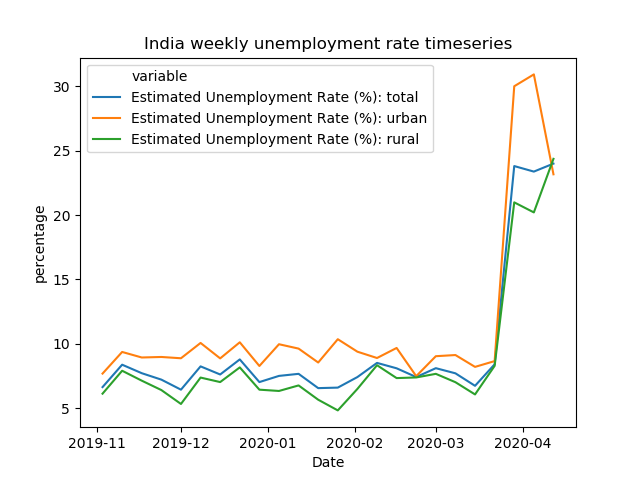
Work by Aaron Ferber
Task 5: List of policies and their effect
task manager by Kritika Rupauliha
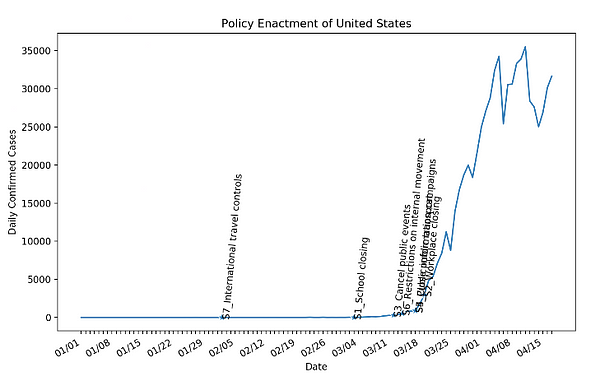
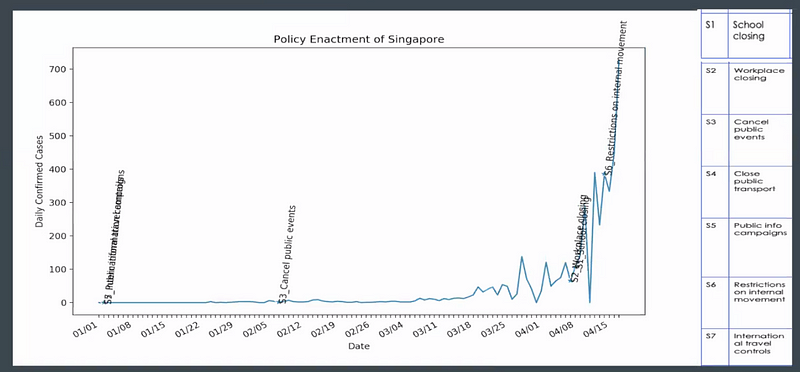
Work by Arthur Wandzel
This is an ongoing work and above are only some of the results. At the end of May, we will publish all results including co-relation models.
Conclusion
In these difficult times, we at Omdena are optimistic about the future. We want to work towards building a future where not only the rich and powerful have a say but everyone’s voice is taken into account. A world that is driven by empathy and care for everyone and where a global community using advanced technologies like AI solves real-world problems for the people, by the people.
In conclusion, a quote that I will remind everyone at this time:
“Any society that would give up a little liberty to gain a little security will deserve neither and lose both” — Benjamin Franklin
I would like to thank Mauricio Calderon Chris P. Lara Neeraj Mistry Branka Panic Virginie MARTINS de NOBREGA for expert advice.
Here are some of the collaborators in this project (in alphabetical order):
Aaron Ferber, Ajaykumar G P Palaniswamy, Alan Ionita, Albina Latifi, Anis Ismail, Anju Mercian, Arthur Wandzel, Baidurja Ray, Bushra Akram, Cesar Velásquez, Elke Klaassen, Farhad Sadeghlo, Hassan Shallal, Hunar Batra, Kritika Rupauliha, Kunal Sinha, Kushal Vala, Magdalena Kalbarczyk, Mbithe Nzomo, Mircea Ioan Calincan, Mohammed Ba Salem, Nikhel Gupta, Nikolaus Siauw, Reem Mahmoud, Rohet Sareen, Sanchit Bhavsar, Shubham Mahajan, Sridatt More, Yash Bangera.

Omdena’s Covid19 initiative in NASDAQ billboard at Times Square NYC
References
[1] https://kareningalasmith.com/2020/04/14/2020/
[4] https://www.bbc.com/news/world-europe-52216966
[5] https://www.cbsnews.com/news/coronavirus-pandemic-food-banks-us-unemployment-new-orleans/
[6] https://www.thenewhumanitarian.org/fr/node/255080
[7] https://www.nytimes.com/2020/04/10/magazine/coronavirus-economy-debate.html
[8] https://fee.org/articles/why-taiwan-hasnt-shut-down-its-economy/
Want to work with us?




